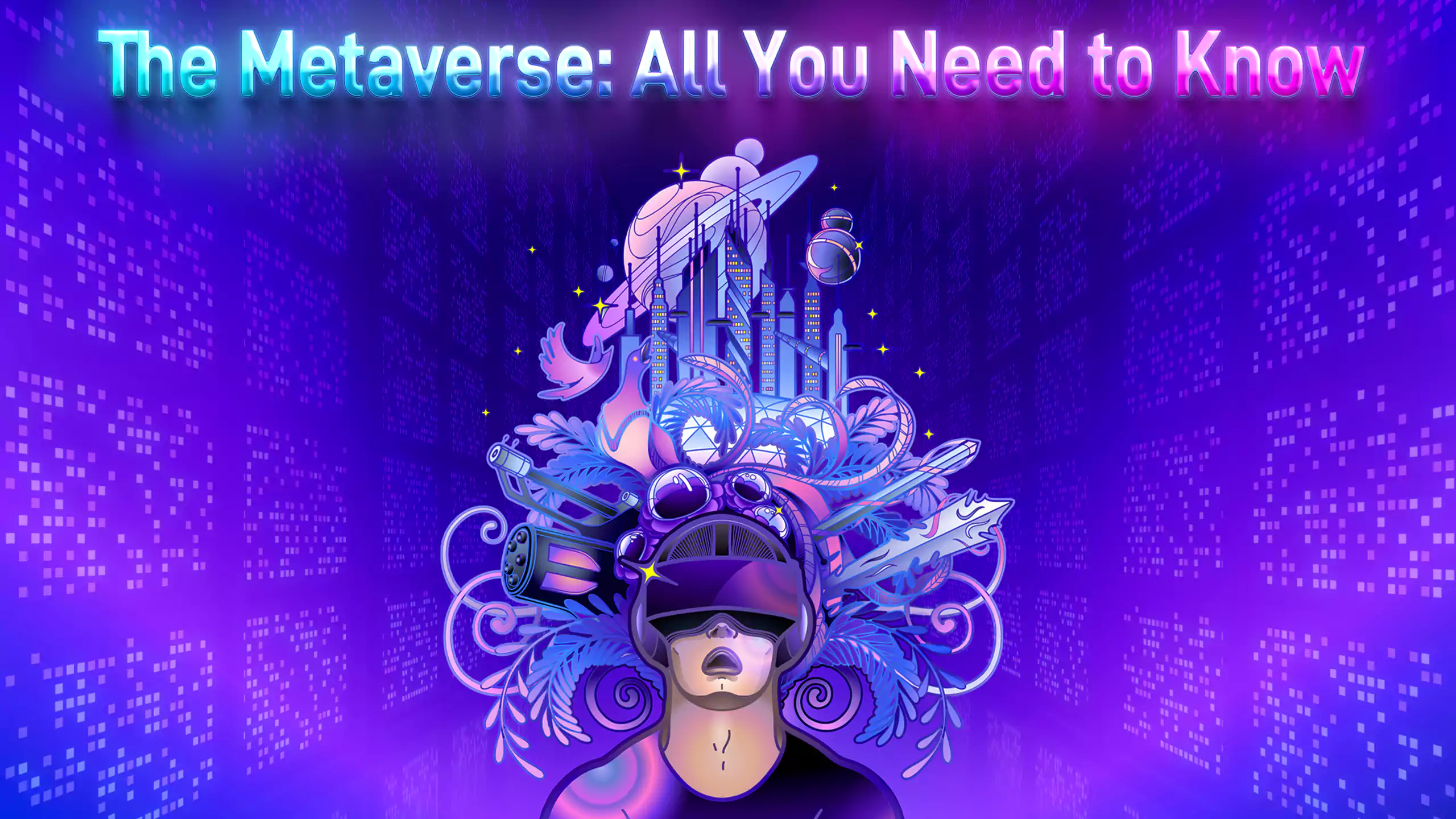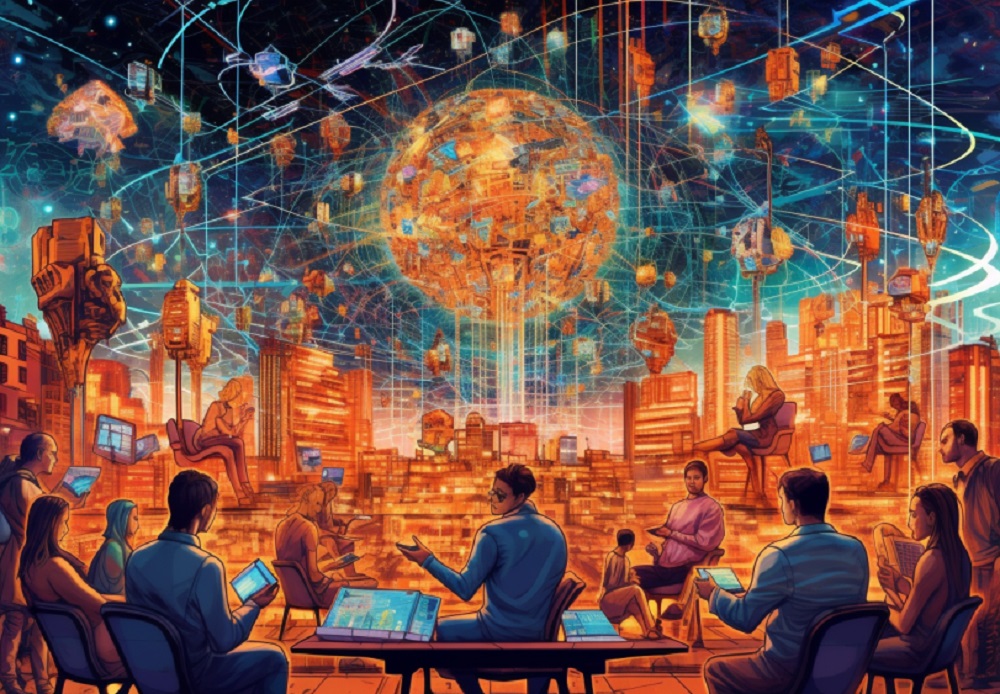Imagine a world where a VR headset is all you need to attend a business meeting anywhere in the world. A world with a marketplace where you can buy, sell, and exchange items, including digital assets like virtual clothing, avatars, event tickets, and NFTs.
The metaverse is an artificial world that makes this possible. But there's more.
Metaverse isn't just Silicon Valley's favorite buzzword; it is the new chapter of the internet, a new way to live. Starting earlier this year, when Mark Zuckerberg announced that the future of Facebook is in the metaverse, there's been plenty of inquiry into the metaverse and its implications for tech. However, we find that the metaverse fever traces back to October 2021, when Facebook rebranded as Meta. And ever since, every company, from Nvidia to Microsoft, has suddenly gotten into the metaverse business.
But, what is the metaverse, and why is it such a big deal?
What is the Metaverse?
In the main, the metaverse is an embodied internet. People meet in a social sphere, using personalized avatars to feel more present than on a regular video call. Its synchronous feature makes it feel more like real life than social media, where, instead of catching up on what other users have been doing, you catch up with them in real-time.
Just like in our physical world, it will be persistent. As a result, when you return to a metaverse space, you will resume where you left off. It encompasses all kinds of experiences—playing—playing games, attending concerts, hanging out, shopping, and working. You can also buy Lands in popular spaces like Cryptovoxels, The Sandbox, and Decentraland, all available on OpenSea.
This is the metaverse, but it exists only in its rudimentary form so far. Its forerunners, virtual reality (VR) games Fortnite and Roblox, have succeeded in generating considerable buzz. VR is often confused with the metaverse, and understandably so.
The embodied presence feature, largely enabled by VR and AR, makes for a more realistic experience when wearing a headset instead of an avatar that you control with a gamepad or keyboard. However, beyond VR and AR, the metaverse will need multiple device categories to work efficiently.
Many have hailed Fortnite and Roblox as early manifestations of the metaverse. And it's true that these games tick a few boxes for what the metaverse will become. They are social spheres with avatars, in-game economies, and live events that transcend gaming alone. However, you cannot take your Fortnite avatar to your Microsoft Team meeting, and neither will any business outside of Roblox accept Roblox for payment.
This is because the metaverse isn't a single service; rather, it's a collection of services tied together by companies building road links to their services and people shuffling from one destination to another. This explains why we can't regard avatar-based services like Second Life alone as the metaverse. Just as phones wouldn't be what they are without other apps and services, the success of the metaverse is dependent on interconnected services.
Top Questions About the Metaverse
The metaverse fever didn't start with Zuckerberg's bromance with VR. Instead, there's a backstory to its rave: from millions adopting avatar-based gaming to the pandemic driving our appetite for real-life interaction and the big tech hunters hunting for the next big thing after smartphones. This raises four major questions.
What category of services will be the gatekeepers of the metaverse?
Companies invested in making futuristic AR and VR headsets are at a great vantage point to cash out and create rules for the metaverse. This is why Meta's interest in the metaverse comes from Zuckerberg's realization that the company has a weak footing in mobile hardware, leaving it with no other choice than to play by the rules of Apple's and Google's app stores.
Presently, Tim Berners-Lee's World Wide Web Consortium regulates the rules and standards of the metaverse. But it's important to state that the metaverse doesn't have a creator.
What are the privacy and safety concerns to watch out for?
Facebook, Youtube, and several social networks have been accused of privacy issues and bungling user information. These issues are front-burner issues in data privacy, mostly due to their effects on users' mental health. No doubt, these issues won't disappear in the metaverse; instead, they will play out in different forms.
Millions of moderators may be insufficient to prevent possible harassment and hate in such real-time environments. Likewise, spatial data sourced by headsets surveying people's lives and lifestyles will raise novel privacy questions. These are crucial considerations for potential industries or regulators in the metaverse.
How do we pay for services in the metaverse?
Consumer internet access is largely driven by advertising and subscription revenues. And while these models can be imported into the metaverse, a return to transactional business models, enabled by decentralized finance and blockchain technology, is already in the mainstream.
Business models will be a major determinant of the scale of companies seeking to build the metaverse. They will also decide the players and participants in this new world, from people to small businesses.
Already, metaverse participants are leveraging decentralized virtual economies like SENSO and other cryptocurrencies to pay for services in the metaverse.
Who Are The Major Players in The Metaverse?
Today, many countries are vying to build the metaverse, and we can already see some big players on the horizon. In 2021, Meta spent over $10 billion building metaverse technologies like social VR apps, VR hardware, and AR wearables. Meanwhile, Roblox's partly metaverse world generated $454 million in revenue in Q2 of 2021. It boasts over 43 million daily users.
Epic's Unreal Engine is foundational to several AR and VR experiences. It is not surprising that Fortnite generated over $9 billion in revenue in 2018 and 2019. And despite its silence on the metaverse, Apple's AR hardware investments foretell its interest in a metaverse future.
Some estimates have also projected that virtual worlds across e-commerce, advertising, and digital events could be worth over $1 trillion in revenue.
Conclusion
The metaverse is a network that fuses the real and virtual worlds. We can meet, shop, work, hang out, attend events, explore the internet, and more. However, it is still a work in progress as we don't have a fully-fledged metaverse just yet. There are numerous technical hurdles to overcome and online infrastructure to build. This will help integrate and sustain billions of people in the metaverse.






